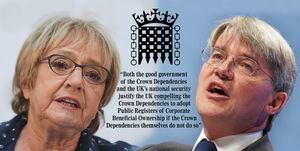‘UK has legal powers to force public register’
CAMPAIGNING MPs have argued that the UK’s national security and the good government of the islands justify the UK compelling the Crown Dependencies to act on financial secrecy measures.

Andrew Mitchell and Dame Margaret Hodge have upped the stakes with their latest response to Guernsey over it and Jersey and the Isle of Man’s resistance to introduce public registers of beneficial ownership, even citing the Salisbury poison attack.
Guernsey has made it clear that the UK should not legislate for it in domestic issues and only a last-minute decision by the UK Government on Monday to pull the financial services bill from debate appeared to stave off the intervention for now.
In a letter to Policy & Resources president Gavin St Pier, the two MPs sought to shift focus away from it being a domestic issue.
They argued that the 1973 Kilbrandon Report, which examined the constitutional relationships in the UK and the islands, is definitive in that the UK has sufficient legal powers to compel the Crown Dependencies to adopt open registers of beneficial ownership because:
n The UK is responsible for ensuring the ‘good government’ of the Crown Dependencies and these Public Registers are important for that ‘good government’
n Prospective money laundering taking place through the Crown Dependencies threatens the UK’s national security and is an issue within the jurisdiction of the UK.
‘Both the good government of the Crown Dependencies and the UK’s national security justify the UK compelling the Crown Dependencies to adopt public registers of corporate beneficial ownership if the Crown Dependencies themselves do not do so. These registers are important if we are to fight corruption, money laundering and terrorist financing. In 2018, following the publication of the Paradise Papers and the Skripal attack in Salisbury, the British Government has additional reasons to support these registers.’
Guernsey has a private register where information is shared with law enforcement and tax authorities.
It has argued the data is much more complete than the UK’s public register.
Deputy St Pier has said there was much with which to disagree in the letter and there would be a full response.
Comment Page 10





